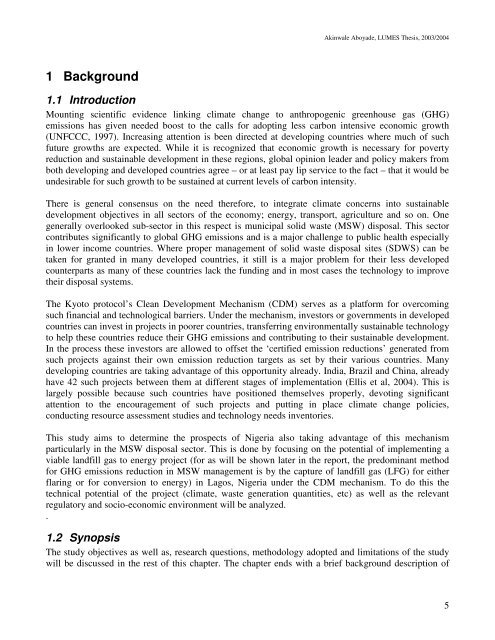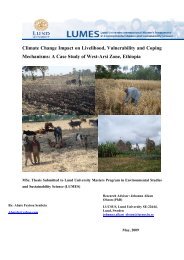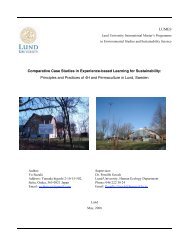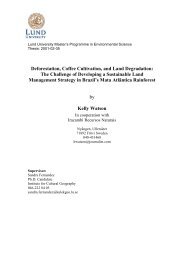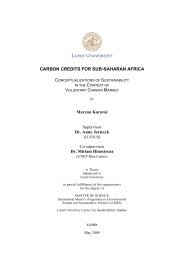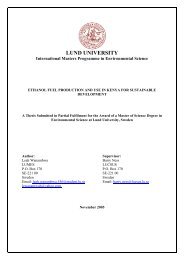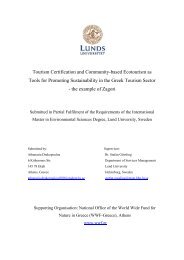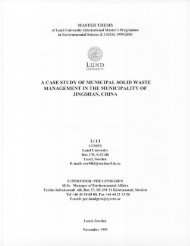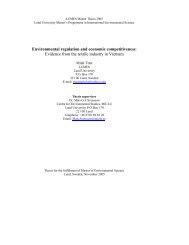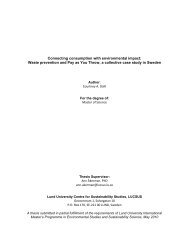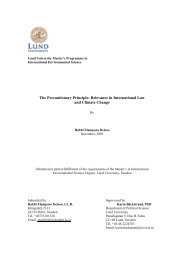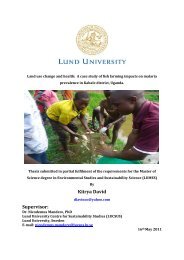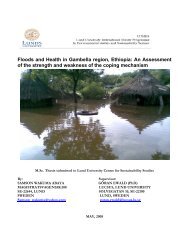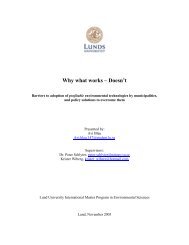Wale Aboyade's thesis - lumes
Wale Aboyade's thesis - lumes
Wale Aboyade's thesis - lumes
Create successful ePaper yourself
Turn your PDF publications into a flip-book with our unique Google optimized e-Paper software.
Akinwale Aboyade, LUMES Thesis, 2003/2004<br />
1 Background<br />
1.1 Introduction<br />
Mounting scientific evidence linking climate change to anthropogenic greenhouse gas (GHG)<br />
emissions has given needed boost to the calls for adopting less carbon intensive economic growth<br />
(UNFCCC, 1997). Increasing attention is been directed at developing countries where much of such<br />
future growths are expected. While it is recognized that economic growth is necessary for poverty<br />
reduction and sustainable development in these regions, global opinion leader and policy makers from<br />
both developing and developed countries agree – or at least pay lip service to the fact – that it would be<br />
undesirable for such growth to be sustained at current levels of carbon intensity.<br />
There is general consensus on the need therefore, to integrate climate concerns into sustainable<br />
development objectives in all sectors of the economy; energy, transport, agriculture and so on. One<br />
generally overlooked sub-sector in this respect is municipal solid waste (MSW) disposal. This sector<br />
contributes significantly to global GHG emissions and is a major challenge to public health especially<br />
in lower income countries. Where proper management of solid waste disposal sites (SDWS) can be<br />
taken for granted in many developed countries, it still is a major problem for their less developed<br />
counterparts as many of these countries lack the funding and in most cases the technology to improve<br />
their disposal systems.<br />
The Kyoto protocol’s Clean Development Mechanism (CDM) serves as a platform for overcoming<br />
such financial and technological barriers. Under the mechanism, investors or governments in developed<br />
countries can invest in projects in poorer countries, transferring environmentally sustainable technology<br />
to help these countries reduce their GHG emissions and contributing to their sustainable development.<br />
In the process these investors are allowed to offset the ‘certified emission reductions’ generated from<br />
such projects against their own emission reduction targets as set by their various countries. Many<br />
developing countries are taking advantage of this opportunity already. India, Brazil and China, already<br />
have 42 such projects between them at different stages of implementation (Ellis et al, 2004). This is<br />
largely possible because such countries have positioned themselves properly, devoting significant<br />
attention to the encouragement of such projects and putting in place climate change policies,<br />
conducting resource assessment studies and technology needs inventories.<br />
This study aims to determine the prospects of Nigeria also taking advantage of this mechanism<br />
particularly in the MSW disposal sector. This is done by focusing on the potential of implementing a<br />
viable landfill gas to energy project (for as will be shown later in the report, the predominant method<br />
for GHG emissions reduction in MSW management is by the capture of landfill gas (LFG) for either<br />
flaring or for conversion to energy) in Lagos, Nigeria under the CDM mechanism. To do this the<br />
technical potential of the project (climate, waste generation quantities, etc) as well as the relevant<br />
regulatory and socio-economic environment will be analyzed.<br />
.<br />
1.2 Synopsis<br />
The study objectives as well as, research questions, methodology adopted and limitations of the study<br />
will be discussed in the rest of this chapter. The chapter ends with a brief background description of<br />
5


